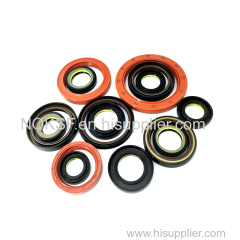
Factory Wholesales TC TG SC VC TB TA Oilseal NBR FKM PTFE ACM PU Oil Seals
| Min. Order: | 500 Piece/Pieces |
|---|---|
| Payment Terms: | L/C, D/P, D/A, T/T, WU |
| Supply Ability: | 10000000 |
| Place of Origin: | Hebei |
Company Profile
| Location: | Xingtai, Hebei, China (Mainland) |
|---|---|
| Business Type: | Manufacturer |
Product Detail
| Means of Transport: | Ocean, Air, Land |
|---|---|
| Standard or Nonstandard: | Standard |
| Style: | Others |
| Material: | Rubber |
| Brand Name: | nqksf |
| Application: | Industrial bearing, Pump Hydraulic Machine Rotary Shaft |
| Feature: | Oil/ Heat/ High Pressure Resistance, Durable |
| MOQ: | 10 PCS |
| Production Capacity: | 10000000 |
| Packing: | 10 pcs/ 1 paper scroll |
| Delivery Date: | 7-15 |
Product Description
Oil seals are critical components in mechanical systems, serving essential roles across various industries, from industrial machinery to household appliances. But what materials are oil seals made from, and what specific functions do they serve? Let's explore.
Common Oil Seal Materials
The selection of oil seal materials depends on the operational environment and requirements. Common materials include:
Nitrile Rubber (NBR): Suitable for temperatures between -40°C and 125°C, offering good oil resistance and wear properties.
Fluororubber (FKM): Known for its high-temperature resistance, FKM works in temperatures from -20°C to 250°C, ideal for high-heat environments.
Silicone Rubber (VMQ): Offers a wide operating temperature range from -60°C to 225°C, excelling in low-temperature conditions.
Acrylic Rubber (ACM): Resists heat and oil well, functioning in temperatures from -25°C to 150°C.
Polyurethane (PU): Exhibits excellent wear resistance, suitable for moderate environments with temperatures between -20°C and 120°C.
Polytetrafluoroethylene (PTFE): Renowned for its outstanding chemical and temperature resistance, PTFE operates between -65°C and 260°C.
Functions of Oil Seals
The primary function of oil seals is to prevent the leakage of lubricating oil, ensuring efficient lubrication between mechanical parts. Additionally, they block external contaminants like dust or dirt from entering the machinery, thereby enhancing performance and extending the lifespan of the equipment.
Applications of Oil Seals
Automotive and Motorcycle Engines: Oil seals are used to seal crankshafts and camshafts, preventing oil leakage in the engine.
Agricultural and Construction Equipment: Oil seals play a crucial role in sealing transmission systems in machinery such as excavators and bulldozers.
Industrial Gearboxes: Oil seals ensure proper lubrication in gear systems, reducing wear caused by friction during operation.
Hydraulic Systems: Oil seals maintain the stability of hydraulic components, such as pumps and motors, by preventing hydraulic fluid leakage and ensuring optimal performance.
In conclusion, oil seals are indispensable in modern machinery. Their proper application not only enhances the efficiency of equipment but also extends its operational life, ensuring long-term reliability and stability.

